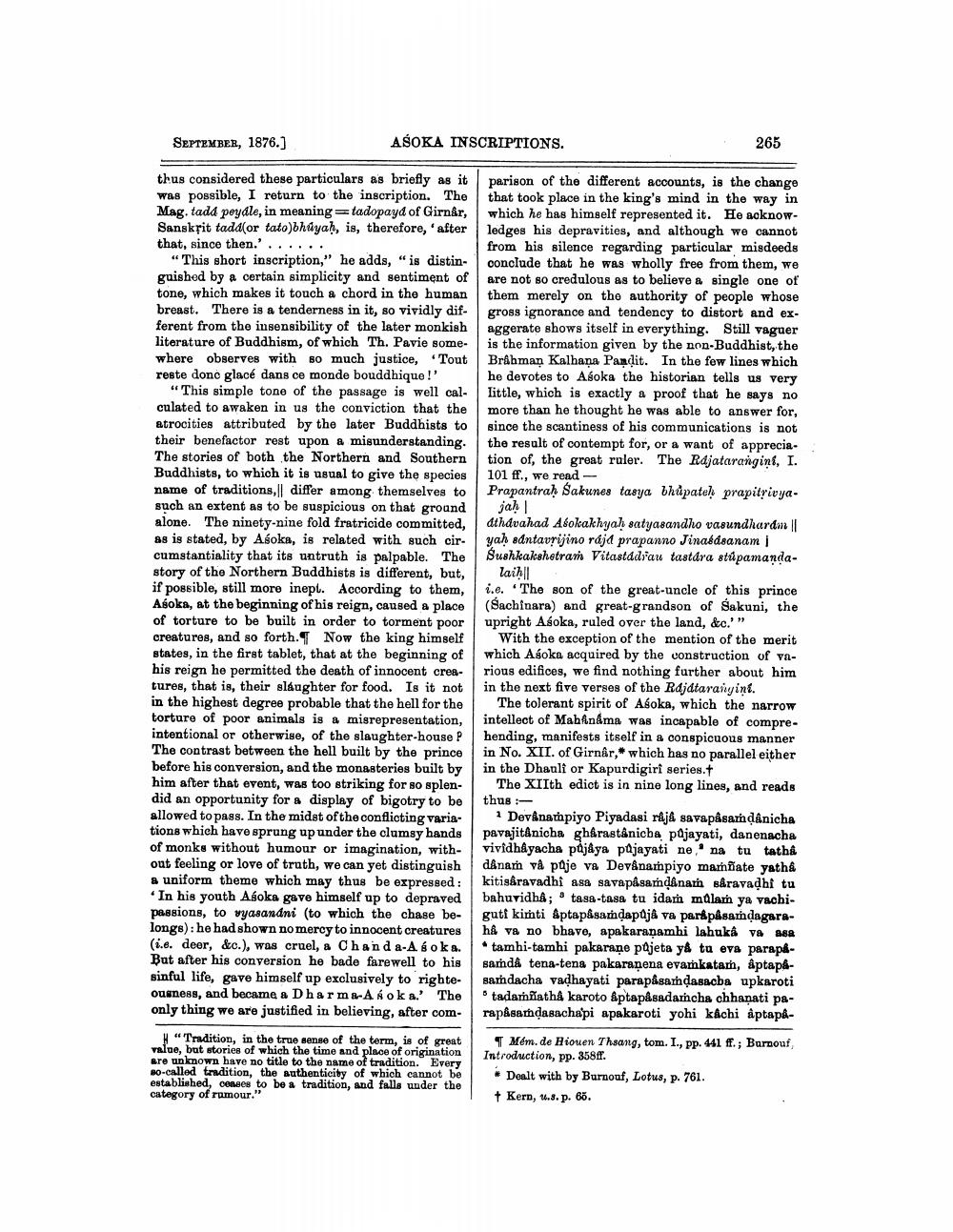________________
SEPTEMBER, 1876.)
AŚOKA INSCRIPTIONS.
265
thus considered these particulars as briefly as it parison of the different accounts, is the change was possible, I return to the inscription. The that took place in the king's mind in the way in Mag. tada poydle, in meaning=tadopayd of Girnar, which he has himself represented it. He acknowSansksit tadd(or tato)bhūyaḥ, is, therefore, 'after ledges his depravities, and although we cannot that, since then.'......
from his silence regarding particular misdeeds “This short inscription," he adds, “is distin- conclude that he was wholly free from them, we guished by a certain simplicity and sentiment of are not so credulous as to believe & single one of tone, which makes it touch a chord in the human them merely on the authority of people whose breast. There is a tenderness in it, so vividly dif- gross ignorance and tendency to distort and exferent from the insensibility of the later monkish aggerate shows itself in everything. Still vaguer literature of Buddhism, of which Th. Pavie some- is the information given by the non-Buddhist, the where observes with so much justice, "Tout Brahman Kalhana Pandit. In the few lines which reste donc glacé dans ce monde bouddhique! he devotes to Asoka the historian tells us very
"This simple tone of the passage is well cal. little, which is exactly a proof that he says no culated to awaken in us the conviction that the more than he thought he was able to answer for, atrocities attributed by the later Buddhists to since the scantiness of his communications is not their benefactor rest upon a misunderstanding the result of contempt for, or a want of appreciaThe stories of both the Northern and Southerntion of the great ruler. The Rdjatarangini, I. Buddhists, to which it is usual to give the species | 101 ff., we readname of traditions, ll differ among themselves to Prapantra) Sakunes tasya bhupateh prapitrivya. such an extent as to be suspicious on that ground jah alone. The ninety-nine fold fratricide committed, athavahad Asokakhyah satyasandlo vasundhardm || as is stated, by Asoka, is related with such cir. | yah adntavrijino rájd prapanno Jinaldeanami cumstantiality that its untruth is palpable. The Sushkakshetran Vitastddrau tastdra stúpamandastory of the Northern Buddhists is different, but, laihll if possible, still more inepl. According to them, | i.e. The son of the great-uncle of this prince Asoka, at the beginning of his reign, caused a place (Sachinara) and great-grandson of Sakuni, the of torture to be built in order to torment poor upright Asoka, ruled over the land, &c.'" creatures, and so forth. Now the king himself With the exception of the mention of the merit states, in the first tablet, that at the beginning of which Asoka acquired by the construction of vahis reign he permitted the death of innocent crea- rious edifices, we find nothing further about him tures, that is, their slaughter for food. Is it not in the next five verses of the Rajstaranyini. in the highest degree probable that the hell for the The tolerant spirit of Asoka, which the narrow torture of poor animals is & misrepresentation, intellect of Mah nama was incapable of compreintentional or otherwise, of the slaughter-house P hending, manifests itself in a conspicuous manner The contrast between the hell built by the prince in No. XII. of Girnår, which has no parallel either before his conversion, and the monasteries built by in the Dhauli or Kapurdigiri series. him after that event, was too striking for so splen- The XIIth edict is in nine long lines, and reads did an opportunity for a display of bigotry to be thus :allowed to pass. In the midst of the conflicting varia- Devânatpiyo Piyadasi raja savapasamdânicha tions which have sprung up under the clumsy hands pavajitânicha gharastânicba pājayati, danenacha of monks without humour or imagination, with- vividhåyacha påjåya pajayati ne, na tu tatha out feeling or love of truth, we can yet distinguish
dânạn và paje va Devẫnanpiyo manĨate yathế a uniform theme which may thus be expressed : kitisäravadhi asa savapasamdanam säravadhi tu
In his youth Asoka gave himself up to depraved bahuvidha;' tasa-tasa tu idam malam ya vachipassions, to wyasandni (to which the chase be- gutf kimti Aptap&samdapdjâ va parkpåsandagaralongs): he had shown no mercy to innocent creatures hi va no bhave, apakaranamhi lahuka va SR (i.e. deer, &c.), was cruel, a Chand a-A soka. tamhi-tamhi pakarane pijeta ya tu eva parapaBut after his conversion he bade farewell to his samda tena-tena pakaranena evankatam, &ptapasinful life, gave himself up exclusively to righte- samdacha vadhayati parapåsardasacba upkaroti ousness, and became a Dharma-Ahoka.' The • tadamathå karoto &ptapåsadamcha chhanati paonly thing we are justified in believing, after com- rapasamdasachapi apakaroti yohi kachi âptapa
W "Tradition, in the true senge of the term, is of great value, but stories of which the time and place of origination are unknown have no title to the name of tradition. Every 80-called tradition, the authenticity of which cannot be established, conses to be a tradition, and falls under the category of rumour."
Mém. de Hiouen Thsang, tom. I, pp. 441 ff.; Burnout Introduction, pp. 358ff.
* Dealt with by Burnoaf, Lotus, p. 761. + Kern, 14.3. p. 65.




